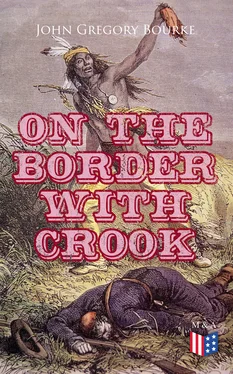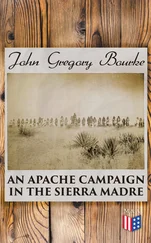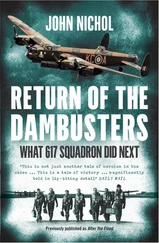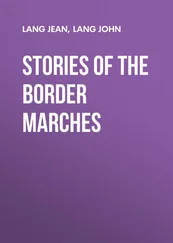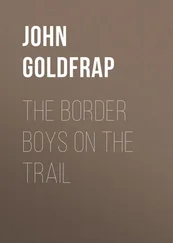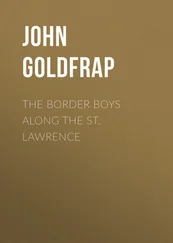For the beauties or eccentricities of nature we had no eyes. All that we cared to know was how long it would take to put us where the train had been ambushed and destroyed. So, on we pushed, taking a very brisk gait, and covering the ground with rapidity.
The sun was going down in a blaze of scarlet and gold behind the Tortolita Range, the Cañon del Oro was yet several miles away, and still no signs of the party of which we were in such anxious search. “They must have been nearer the Cañon del Oro than the Mexican thought,” was the general idea, for we had by this time gained the long mesa upon which we had been led to believe we should see the ruins of the wagons.
We were now moving at a fast walk, in line, with carbines at an “advance,” and everything ready for a fight to begin on either flank or in front, as the case might be; but there was no enemy in sight. We deployed as skirmishers, so as to cover as much ground as possible, and pick up any dead body that might be lying behind the mesquite or the palo verde which lined the road. A sense of gloom spread over the little command, which had been hoping against hope to find the survivors alive and the savages still at bay. But, though the coyote yelped to the moon, and flocks of quail whirred through the air when raised from their seclusion in the bushes, and funereal crows, perched upon the tops of the pitahayas, croaked dismal salutations, there was no sound of the human voices we longed to hear.
But don’t be too sure. Is that a coyote’s cry or the wail of a fellow-creature in distress? A coyote, of course. Yes, it is, and no, it isn’t. Every one had his own belief, and would tolerate no dissent. “Hel-lup! Hel-lup! My God, hel-lup!” “This way, Mott! Keep the rest of the men back there on the road.” In less than ten seconds we had reached a small arroyo, not very deep, running parallel to the road and not twenty yards from it, and there, weak and faint and covered with his own blood, was our poor, unfortunate friend, Kennedy. He was in the full possession of his faculties and able to recognize every one whom he knew and to tell a coherent story. As to the first part of the attack, he concurred with Domingo, but he furnished the additional information that as soon as the Apaches saw that the greater number of the party had withdrawn with the women and children, of whom there were more than thirty all told, they made a bold charge to sweep down the little rear-guard which had taken its stand behind the wagons. Kennedy was sure that the Apaches had suffered severely, and told me where to look for the body of the warrior who had killed his partner, Israel. Israel had received a death-wound in the head which brought him to his knees, but before he gave up the ghost his rifle, already in position at his shoulder, was discharged and killed the tall, muscular young savage who appeared to be leading the attack.
Kennedy kept up the unequal fight as long as he could, in spite of the loss of the thumb of his left hand, shot off at the first volley; but when the Mexicans at each side of him fell, he drew his knife, cut the harness of the “wheeler” mule nearest him, sprang into the saddle, and charged right through the Apaches advancing a second time. His boldness disconcerted their aim, but they managed to plant an arrow in his breast and another in the ribs of his mule, which needed no further urging to break into a mad gallop over every rock and thorn in its front. Kennedy could not hold the bridle with his left hand, and the pain in his lung was excruciating—“Jes’ like ’s if I’d swallowed a coal o’ fire, boys,” he managed to gasp, half inarticulately. But he had run the mule several hundreds of yards, and was beginning to have a faint hope of escaping, when a bullet from his pursuers struck its hind-quarters and pained and frightened it so much that it bucked him over its head and plunged off to one side among the cactus and mesquite, to be seen no more. Kennedy, by great effort, reached the little arroyo in which we found him, and where he had lain, dreading each sound and expecting each moment to hear the Apaches coming to torture him to death. His fears were unfounded. As it turned out, fortunately for all concerned, the Apaches could not resist the temptation to plunder, and at once began the work of breaking open and pilfering every box and bundle the wagons contained, forgetting all about the Mexicans who had made their escape to the foot-hills, and Kennedy, who lay so very, very near them.
Half a dozen good men were left under command of a sergeant to take care of Kennedy, while the rest hurried forward to see what was to be seen farther to the front.
It was a ghastly sight, one which in its details I should like to spare my readers. There were the hot embers of the new wagons, the scattered fragments of broken boxes, barrels, and packages of all sorts; copper shells, arrows, bows, one or two broken rifles, torn and burned clothing. There lay all that was mortal of poor Israel, stripped of clothing, a small piece cut from the crown of the head, but thrown back upon the corpse—the Apaches do not care much for scalping—his heart cut out, but also thrown back near the corpse, which had been dragged to the fire of the burning wagons and had been partly consumed; a lance wound in the back, one or two arrow wounds—they may have been lance wounds, too, but were more likely arrow wounds, the arrows which made them having been burned out; there were plenty of arrows lying around—a severe contusion under the left eye, where he had been hit perhaps with the stock of a rifle or carbine, and the death wound from ear to ear, through which the brain had oozed.
The face was as calm and resolute in death as Israel had been in life. He belonged to a class of frontiersmen of which few representatives now remain—the same class to which belonged men like Pete Kitchen, the Duncans, of the San Pedro; Darrel Duppa and Jack Townsend, of the Agua Fria; men whose lives were a romance of adventure and danger, unwritten because they never frequented the towns, where the tenderfoot correspondent would be more likely to fall in with some border Munchausen, whose tales of privation and peril would be in the direct ratio of the correspondent’s receptivity and credulity.
It was now too dark to do anything more, so we brought up Kennedy, who seemed in such good spirits that we were certain he would pull through, as we could not realize that he had been hit by an arrow at all, but tried to console him with the notion that the small round hole in his chest, from which little if any blood had flown, had been made by a buck-shot or something like it. But Kennedy knew better. “No, boys,” he said sadly, shaking his head, “it’s all up with me. I’m a goner. I know it was an arrow, ’cause I broke the feather end off. I’m goin’ to die.”
Sentinels were posted behind the bushes, and the whole command sat down to keep silent watch for the coming of the morrow. The Apaches might double back—there was no knowing what they might do—and it was best to be on our guard. The old rule of the frontier, as I learned it from men like Joe Felmer, Oscar Hutton, and Manuel Duran, amounted to this: “When you see Apache ‘sign,’ be keerful; ’n’ when you don’ see nary sign, be more keerful.”
The stars shone out in their grandest effulgence, and the feeble rays of the moon were no added help to vision. There is only one region in the whole world, Arizona, where the full majesty can be comprehended of that text of Holy Writ which teaches: “The Heavens declare the glory of God, and the firmament showeth His handiwork.” Midnight had almost come, when the rumble of wheels, the rattle of harness, and the cracking of whips heralded the approach of wagons and ambulance and the second detachment of cavalry. They brought orders from Colonel Dubois to return to the post as soon as the animals had had enough rest, and then as fast as possible, to enable all to start in pursuit of the Apaches, whose trail had been “cut” a mile or two above Felmer’s, showing that they had crossed the Santa Catalina Range, and were making for the precipitous country close to the head of the Aravaypa.
Читать дальше
